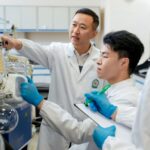 Research Achievements by MPU FCSD Associate Professor Yi Tao Selected as ESI Global Top 0.1% Hot Papers
Research Achievements by MPU FCSD Associate Professor Yi Tao Selected as ESI Global Top 0.1% Hot Papers
Yi Tao, Associate Professor from the Faculty of Health Sciences and Sports (FCSD) of Macao Polytechnic University (MPU), in collaboration with a team from the University of Shanghai for Science and Technology, has been investigating the application of electrospun nanofibers in drug delivery, and his research efforts have led to the publication of numerous papers in international journals. Notably, a number of these papers have been selected as ESI top 0.1% hot papers and top 1% highly cited papers, which demonstrates significant influence and citation value, contributing substantially to research progress and application in relevant fields.
In the current nano-era, nanomedicines and nanomaterials have become focal points in biomedical research and development. Yi and his team have harnessed advanced multi-fluid electrospinning technology to create multi-chamber nanofibers with complex structures. This achievement enables the controlled release of drugs, thus enhancing therapeutic effects. Their research accomplishments include the development of a pH-sensitive oral colon-targeted drug delivery system for anti-cancer drugs, a dual-step controlled-release drug delivery system, and a sustained-release drug delivery system with reverse-gradient drug distribution.
The research team has published four papers in renowned journals including Advanced Composites and Hybrid Materials, International Journal of Molecular Sciences, Biomolecules, and Chemosensors. According to drug characteristics and clinical needs, they have developed a novel approach to achieve controlled drug release by regulating the microstructure of nanofibers at the nanoscale. These papers have garnered a large number of citations in a short span and have been selected as ESI TOP 0.1% hot papers and TOP 1% highly cited papers respectively, offering crucial reference value for research and development in this field.
Essential Science Indicators (ESI) are a vital tool for identifying outstanding research and tracking scientific trends. It is based on tens of millions of literature records from over 11,000 journals worldwide indexed in the Web of Science. ESI ranks countries, institutions, journals, papers, and scientists across 22 professional fields according to publication and citation performance. ESI data covers a rolling 10-year period and is updated bimonthly for rankings and citation counts. Only the most highly cited entities, including individuals, institutions, journals, countries, and papers, are included in ESI. Highly Cited Papers are those that, when compared to all other papers published in the same year and field, have received enough citations to rank in the top 1%. Hot Papers are those that have been cited sufficiently within the most recent bimonthly period to rank in the top 0.1% among peer papers.
Yi’s research is centred on nanomedicines and nanomaterials. He currently serves as a member of the editorial board of Acta Pharmaceutica Sinica and a member of the Chinese medicine preparation branch of the China Association of Chinese Medicine. He has secured multiple research grants, including those from the Science and Technology Development Fund of the Macao Special Administrative Region, the Natural Science Fund of Chongqing, and the Hubei Science and Technology Research Fund. He has also completed a project funded by the National Natural Science Foundation of China project through cooperation. His aforementioned research was supported by the Science and Technology Development Fund of Macao (0061/2023/RIA1) and the MPU scientific research project (RP/FCSD - 01/2023).


